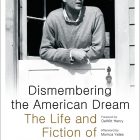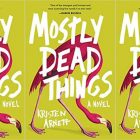The Ensemble by Aja Gabel
 The Ensemble
The Ensemble
Aja Gabel
Riverhead Books | May 15, 2018
In middle age we inevitably take stock of our lives, the choices from long ago and the circumstances of today. The thoughts come unbidden, when we are doing the most ordinary of things. For a moment, even the humdrum turns incandescent. If we have joined our lives to others, their choices and circumstances are part of our reflection, too, for they are part of us.
Near the end of The Ensemble, Aja Gabel’s debut novel, the musicians who comprise a string quartet engage in just that sort of reflection. Having bound themselves together in order to forge a career in the competitive world of classical music, they reflect on lives lived, individually and in concert. Fragments of memory float to the surface as they go about their days of practice and performance. At the same time, they contemplate the future, now that competitive and younger ensembles, repetitive motion injuries, and the needs of spouses and children necessitate midlife course corrections.
The four players meet in graduate school when Jana, first violinist, pushes them to form the quartet. Her ambition is evident in the “quiet, sharp, and precisely timed breath in an upbeat before the first note, on the pressure of her attack on that first note, on the space she left between the first and second notes, on the degree and length and resonance of the vibrato she applied to the violin neck.” Cellist Daniel is awkward, “grown into his instrument, his shoulders rounded, looking in toward the cello, even when there wasn’t one there.” Henry, on viola, is “a bright, boundless light on campus, younger than everyone else, taller than everyone else, a better musician than everyone else, and eager to play anywhere and everywhere.” Brit grounds the group on second violin, with a “note here, and this one, this joyful countermelody, her second violin harmony, the collective intangible, the audible agreement.”
They know ensemble life is risky. Their skills as solo performers will wither. The most prestigious prizes may go to someone else. They will be wedded to the group, perhaps more thoroughly than to a spouse. Though they can’t know this at the outset, over a span of nearly twenty years they will move from California to New York and back to California, fall in love, marry and divorce, have children and flirt with solo careers.
All have backstories. Brit was orphaned at a young age. Jana’s mother is an alcoholic. Daniel’s mother is religious and his father drinks. Henry’s family is loving and supportive. When sickness or death befalls one of the families, as it eventually does, the entire ensemble is affected, so tightly are they bound to one another. After thousands of hours together, each is attuned to the raised eyebrow, cocked elbow and bent waist of the others.
Part of the challenge of living so attuned to others is living apart, and much of the plot concerns the tugs between the two. Jana understands how the gulf has widened when she plays an ensemble piece, solo, at her mother’s funeral. “It made no sense without the other parts. Alone, the chords weren’t thickened and textured, and though the first violins led the charge for most of the melody, the piece didn’t quite have the richness of tragedy that it did when the seconds came in, when the violas were purposefully dissonant, when the celli climbed up to thumb position.” The ensemble, designed to serve her ambition, has changed her.
Music is central to the life of the quartet and also to Gabel who tells the story in lush, expansive prose. Her words swell to fill the page with descriptions of memory, emotion, and music. She studied cello for years and her experience is evident as she spools out the plot, repeats motifs and varies the story’s tempo and dynamics. Music dictates the structure of the book, too, which is arranged in four parts, like a concerto, with a short coda at the end. Within each part, the characters take turns leading the action, as though taking over sections of melody. All this may sound contrived, but it does not come across that way: the story flows as fluidly as if composed by Debussy.
Near the end of the book, the ensemble is on stage for what is probably their last performance together, a fact they do not yet know. A collective thought settles upon them. “They were playing now, like they always had. It wasn’t easy. It never had been. It was something like a miracle, all this music, each note a discovery you’ve already made, but it was also maybe the most ordinary thing in the world, to assemble and compose and perform—night after night—a life.” In this shared midlife moment, the ordinary has become transcendent.



